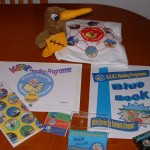Community Problem Solving
"CmPS students show that they care about the world around them – care enough to try to change it, to make a difference, to make the world a better place in which to live." – FPSPI CmPS Coaches’ Guide
In Community Problem Solving (CmPS) teams or indivduals apply the FPS problem solving process to authentic problems in their own community. They develop a plan of action to have an impact on the community issue, then implement their plan of action. CmPS develops the skills of service to the community, an important attribute of giftedness for many Maori and Pacifika students. This action-oriented, authentic learning encourages students to use knowledge meaningfully across disciplines and to become actively engaged in their learning. Students recognise, address and overcome obstacles as they work together to make a positive difference in their own community. CmPS allows students to move from ideas to action. A community problem may take many forms. It may be a problem that exists within the school setting, the local or national community, or even the global community. CmPS provides the vehicle for a significant learning experience, accepting and confronting real-life problems. Community engagement encourages true Ako as students and adults learn from each other. CmPS encourages students to feel good about themselves by giving something back to their community and learning how to apply their skills in the real world.
Many Maori values such as manaakitanga, kaitiakitanga, whanaungatanga play a key role in CmPS as do the values and Key Competencies from the New Zealand Curriculum.
CmPS Projects
Students work on their CmPS for one or two school years and then submit a project report that covers:
• An Area of Concern
• Challenges Identified
• Underlying Problem
• Alternative Solution Ideas
• Plan of Action
• Actions and Outcomes to Date
• Organisation
• Resource Identification & Utilization
• Accomplishments
• Reflection on Project Outcomes
Teams which have reached a national level will be invited to the National Finals.
"I have enjoyed working in a group with other people and getting to know them. I am much more tolerant of others now and I appreciate their strengths. You have to work hard but you enjoy doing it." – Yr 9 student.
Goals of Community Problem Solving
• Experience concrete, real-world applications of problem solving,
• Become actively engaged in their education rather than just being passive
• learners,
• Develop persuasive written and oral communication skills,
• Explore abstract and complex issues,
• Develop critical and creative thinking abilities,
• Use knowledge meaningfully across the disciplines,
• Develop team-building skills,
• Recognize, address, and overcome obstacles,
• Become empowered as learners, leaders, and change-makers,
• Study with people who have expertise in the project topic, and
• Make a difference in the real world!
"Through CmPS….I learnt to persevere, to overcome obstacles, to be a creative problem solver, to look at issues from more than one perspective, to speak and write convincingly, to negotiate and to compromise." - NZ Girdler Scholar 2007

Keri Reading CmPS
Coach
CmPS coaches need to be lifelong learners themselves – open to new experiences and able to appreciate the value of new learning and how it applies in the classroom.
They need to be motivated and passionate about teaching and be able to communicate that passion to students.
They need to be flexible thinkers who are willing to think outside the square.
A CmPS coach is a facilitator who guides students through the process; however there are times when necessary skills will have to be taught either by the teacher or by an expert invited in for the purpose. CmPS is about teaching ‘just in time’ not ‘just in case’.
“I am absolutely convinced that CmPS is the most valid learning experience I have come across. It challenges students to step out of their comfort zones, to take on challenges that, as adults we doubt they will achieve, and to grow so much in their knowledge of not only their project but of life and people. They do achieve their goals and enjoy the very very hard work that goes into a successful project because they invest themselves totally in it.” – CmPS coach
Students
Students who are part of a CmPS team need to display many of the following attributes:
• Thinking creatively and flexibly
• Working collaboratively as part of a team
• Showing a commitment to a cause
• Taking initiative
• Working independently
• Have a ‘can-do’ attitude.
• Enjoying an intellectual challenge and being prepared to take risks
• Acknowledging, accepting and utilising their strengths and the strengths of others
• Manage themselves and others
• Use technologies effectively and efficiently
• Communicate well – oral and/or written (they will learn a lot of these skills in CmPS anyway)
• Show persistence
• Show curiosity
• Demonstrate an interest in giving service to the community
"If you have a really good project that you believe in like we did you just get so involved because you see yourself making a difference and it's heaps of fun. I have learnt so much." – Yr 8 student.
